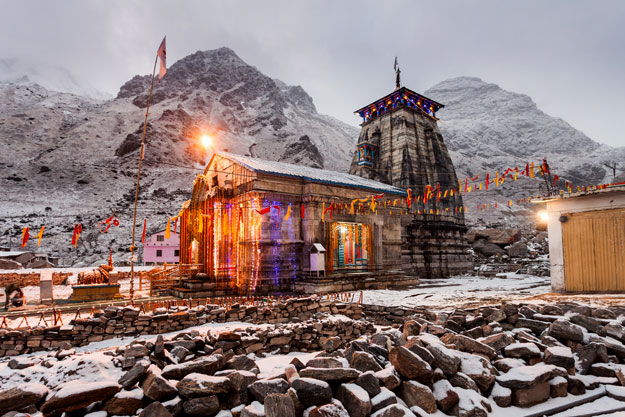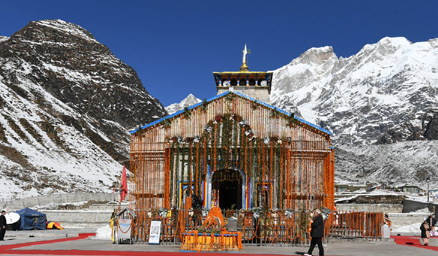Kedarnath, a well-known Shiva temple, is located 3583 meters above sea level in a marshy plain along the Himalayan range. In the breathtaking temple in Kedarnath, where the Mandakini Valley is covered with flowers and the Himalayas are covered in continuous snow, Lord Shiva Lingam was first placed. The Pandavas constructed the prehistoric temple. One of the Dwadasha Jyotirlingas might be this. The outside of the temple has statues of the goddesses Parvati, Pandva, Lakshmi, and other deities. Hanskund is located next to the Kedarnath temple, where Shradha-Tarpan used to carry out the forefathers’ Moksha. Meanwhile, if you wish to discover this serene destination then book your Badrinath Kedarnath Tour Package By Helicopter with us today, or you can even book your Kedarnath Yatra package alone. Retas Kund is located in the small town of Kedarnath, whereas Amrit Kund lies behind the temple. The temple that serves as the source of the Mandakini River is extremely close to the pond of chilly water (ice). Uddandkund is located a few kilometers from the temple, which is significant and has a long history. History of Kedarnath Temple When the Pandavas realized they had killed their blood relatives, they turned to Lord Shiva for forgiveness. Shiva transformed himself into a bull to wander the Garhwal Himalayas since he didn’t wish to forgive them for their sins so easily. Shiva buried himself when the Pandavas found him. Bhim attempted to capture him but was only able to grab his hump. Shiva’s other bodily parts (in the guise of a bull) appeared in various locations. Kedarnath is where the bull’s hunch was found, Madhya-Maheshwar is where its navel was found, Tunganath is where its two were found, Rudranath is where its face was found, and Kalpeshwar is where its hair appeared. Panch Kedar is the collective name for these five holy locations. It is thought that the Kedarnath temple was initially constructed by the Pandavas; the current temple was created by Adi Shankaracharya, who repaired and renewed the splendor of the shrine. So, why wait anymore? Book your Char Dham Helicopter Package with us right away. Best Time to Visit Kedarnath Temple The Kedarnath Yatra is best visited between the months of May and June and September and October when Peak Season begins. How to Reach Kedarnath One of Lord Shiva’s holiest pilgrimages, Kedarnath, is located in the region of Rudraprayag in Uttarakhand’s Garhwal area. Along with being the most significant Panchkedar Dham, Kedarnath is one of Uttarakhand’s Char Dhams. At a height of 3586 meters, Kedarnath is situated in the shadow of a magnificent mountain and close to the Mandakini River’s headwaters. There is no doubt that one of Lord Shiva’s 12 Jyotirlingas may be found within the Kedarnath range. Still, thinking? Book your Kedarnath Yatra package now! Burdened with the guilt of killing their blood relatives, Pandavas sought Lord Shiva to absolve themselves of their sins. Shiva didn’t want to release them from their wrongdoings so easily and disguised himself as a bull to roam in Garhwal Himalayas. On being discovered by Pandavas, Shiva dived into the ground. Bhim tried to catch him and could only get hold of the hump. Other body parts of Shiva (in the form of bull), came up at different places. Hump of the bull was found in Kedarnath, navel emerged at Madhya-Maheshwar, two forelegs appeared at Tunganath, face in Rudranath, and hair came up at Kalpeshwar. Together these five sacred places are called Panch Kedar. It is believed that originally Pandavas built the temple of Kedarnath; the present temple was established by Adi Shankaracharya who restored and revived the glory of the shrine. Burdened with the guilt of killing their blood relatives, Pandavas sought Lord Shiva to absolve themselves of their sins. Shiva didn’t want to release them from their wrongdoings so easily and disguised himself as a bull to roam in Garhwal Himalayas. On being discovered by Pandavas, Shiva dived into the ground. Bhim tried to catch him and could only get hold of the hump. Other body parts of Shiva (in the form of bull), came up at different places. Hump of the bull was found in Kedarnath, navel emerged at Madhya-Maheshwar, two forelegs appeared at Tunganath, face in Rudranath, and hair came up at Kalpeshwar. Together these five sacred places are called Panch Kedar. It is believed that originally Pandavas built the temple of Kedarnath; the present temple was established by Adi Shankaracharya who restored and revived the glory of the shrine. Yes, the Kedarnath hike begins from Gaurikund, and it takes 16 km to go to the temple. Visitors to Kedarnath are advised to be in good physical condition because the trip is quite difficult in some parts. Facilities like Kandi, Palki, and Mules are available for seniors and kids. There are tiny stores and proper drinking water amenities along the walking route. Additionally, there is a helicopter service to Kedarnath from Phata and other helipads. Please be aware that these are high-altitude places, so it is recommended that anybody with pulmonary or cardiovascular issues get medical advice before visiting these areas. Every year, the Kedarnath Yatra starts in April or May (Akshay Tritya) and lasts till Bhai Dooj, which is the day after Diwali. Due to severe snowfall and frigid temperatures after Bhai Dooj, the temple’s doors will stay closed for the next five to six months. The sacred site is situated in the Himalayan Mountains, where survival is difficult because of unpredictable weather. Therefore, if you wish to book your Kedarnath Yatra Package With Helicopter, plan with us. Due to its high Himalayan location, Kedarnath Temple experiences cool nights in May and June. Add a first aid kit, appropriate footwear with a firm grip, slippers or sandals, and thick wool gear like a winter coat, coat, sweater, protective gloves, and woolen socks. Given the unpredictability of the weather in this region, a raincoat is a requirement. Since Kedarnath offers basic medical services, you must bring your own medications on your vacation and have prescriptions for those medications, ideally along with a letter from your doctor. Puja can be performed in the temple in a variety of ways. However, a system for practicing Puja exists because of the large number of pilgrims. By contacting the Badri-Kedar Temple Samiti in advance, one can reserve a Puja time window. If such a circumstance occurs, one can use Palki or Ponies to go where they’re going. Another alternative is to spend the night in one of the camps at Jungle Chatti, Bheem Bali, or Lincholi during the trek and then set off the next morning. Meanwhile, do you wish to go on this spiritual journey? Plan your tour with Book My Char Dham Yatra, the Best Travel Agent For Chardham Yatra. Kedarnath is amongst the many sacred pilgrimages of Lord Shiva situated in Rudraprayag district of Garhwal region in Uttarakhand. Kedarnath is certainly one associated with Char Dham in Uttarakhand while the most dham that is crucial Panch kedar. Kedarnath is found at an altitude of 3586 mts, in the lap for the mountain that is majestic and near the head of river Mandakini, Kedarnath range stands one of the twelve Jyotirlingas of Lord Shiva. [carousel_slide id=’9291′] [carousel_slide id=’9291′] [carousel_slide id=’9291′]
Kedarnath Yatra Package
LEGEND BEHIND THE KEDARNATH TEMPLE
WHAT TO SEE IN KEDARNATH DHAM?
FAQs
KEDARNATH YATRA PACKAGES
READ OUR CHARDHAM BLOGS & UPDATES
Kedarnath Yatra
What should you keep in your bag for the Kedarnath Yatra? What may one give to the Kedarnath Temple?



